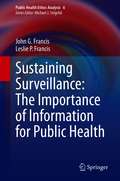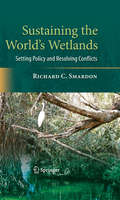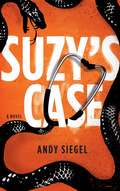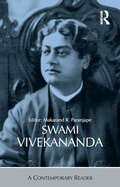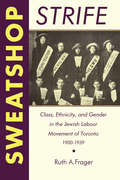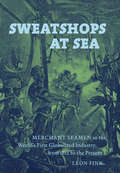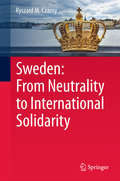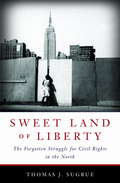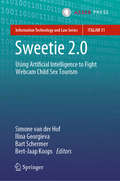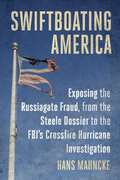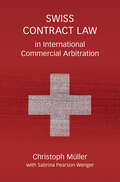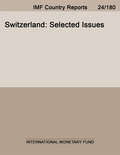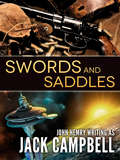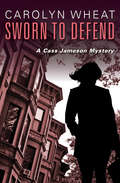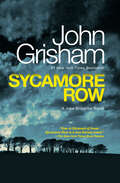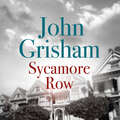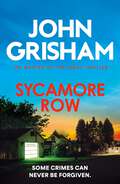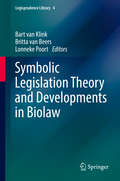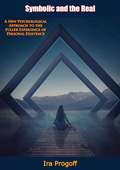- Table View
- List View
Sustaining Surveillance: The Importance of Information for Public Health (Public Health Ethics Analysis #6)
by Leslie P. Francis John G. FrancisThis book presents a comprehensive theory of the ethics and political philosophy of public health surveillance based on reciprocal obligations among surveillers, those under surveillance, and others potentially affected by surveillance practices. Public health surveillance aims to identify emerging health trends, population health trends, treatment efficacy, and methods of health promotion--all apparently laudatory goals. Nonetheless, as with anti-terrorism surveillance, public health surveillance raises complex questions about privacy, political liberty, and justice both of and in data use. Individuals and groups can be chilled in their personal lives, stigmatized or threatened, and used for the benefit of others when health information is wrongfully collected or used. Transparency and openness about data use, public involvement in decisions, and just distribution of the benefits of surveillance are core elements in the justification of surveillance practices. Understanding health surveillance practices, the concerns it raises, and how to respond to them is critical not only to ethical and trustworthy but also to publicly acceptable and ultimately sustainable surveillance practices. The book is of interest to scholars and practitioners of the ethics and politics of public health, bioethics, privacy and data technology, and health policy. These issues are ever more pressing in pandemic times, where misinformation can travel quickly and suspicions about disease spread, treatment efficacy, and vaccine safety can have devastating public health effects.
Sustaining the World's Wetlands
by Richard SmardonWritten both as a textbook and as a professional reference book, Sustaining the World's Wetlands: Setting Policy and Resolving Conflicts contains detailed case studies of wetland management worldwide. Examinations of international wetland policy in Europe, Africa, Asia, and North America generate a discussion of the differences between wetland management issues in developed and developing countries, and culminate in suggested strategies for the future of wetland management. Key themes addressed in the case studies include the tradeoffs between sustainable use of wetlands for food, fuel, and fiber vs. the protection of ecosystem diversity and stability, and the respective roles of big international NGO's, national and regional government, and local community-based organizations when faced with wetland management issues. With its global scope and its emphasis on policy and management analysis, Sustaining the World's Wetlands is a unique and valuable tool both for students and for practitioners.
Suzy's Case
by Andy SiegelThis wild ride of a debut thriller is packed with insider details that reveal the fascinating world of a New York lawyer who'll stop at nothing to secure justice. Introducing Tug Wyler, a dogged and irreverent New York City personal injury and medical malpractice attorney. He is as at home on the streets as he is in the courtroom, and larger than life in both places. Once you've met him, you won't ever forget him. When Henry Benson, a high-profile criminal lawyer known for his unsavory clients, recruits Tug to take over a long-pending multimillion-dollar lawsuit representing a tragically brain-damaged child, his instructions are clear: get us out of it; there is no case. Yet the moment Tug meets the disabled but gallant little Suzy Williams and June, her beautiful, resourceful mother, all bets are off. With an offbeat, self-mocking style, Tug Wyler's a far cry from your ordinary lawyer. Unswerving in his dedication to his mostly disadvantaged clients, he understands only too well how badly they need him with the system stacked against them. Tug is honest about his own shortcomings, many of them of the profoundly politically incorrect variety, and his personal catchphrase, handy in all situations, is "At least I admit it." When his passionate commitment to Suzy's case thrusts him into a surreal, often violent sideshow, the ensuing danger only sharpens his obsession with learning what really happened to Suzy. Blending razor-sharp intuition, intellectual toughness, and endlessly creative legal brinkmanship, Tug determinedly works his way through a maze of well-kept secrets--encountering a cast of memorably eccentric characters along the way--to get to the truth. Among the many fresh-to-the-genre pleasures of Suzy's Case is its eye-opening portrait of the brutally tough world of medical malpractice law in New York City, an aggressive, very-big-bucks, winner-takes-all game in which lawyers relentlessly cut corners, deals--and throats. With Andy Siegel as the expert guide to his daily home turf, that largely unseen medicolegal universe, where life--and death--always have a price, you'll experience its addictive, risk-taking reality. The result is a stunning debut as gripping as it is unexpected, as rollicking as it is compassionate, revealing Andy Siegel to be a bright new voice of remarkable energy, wit, and style.
Suzy's Case
by Andy SiegelThis wild ride of a debut thriller is packed with insider details that reveal the fascinating world of a New York lawyer who'll stop at nothing to secure justice. Introducing Tug Wyler, a dogged and irreverent New York City personal injury and medical malpractice attorney. He is as at home on the streets as he is in the courtroom, and larger than life in both places. Once you've met him, you won't ever forget him. When Henry Benson, a high-profile criminal lawyer known for his unsavory clients, recruits Tug to take over a long-pending multimillion-dollar lawsuit representing a tragically brain-damaged child, his instructions are clear: get us out of it; there is no case. Yet the moment Tug meets the disabled but gallant little Suzy Williams and June, her beautiful, resourceful mother, all bets are off. With an offbeat, self-mocking style, Tug Wyler's a far cry from your ordinary lawyer. Unswerving in his dedication to his mostly disadvantaged clients, he understands only too well how badly they need him with the system stacked against them. Tug is honest about his own shortcomings, many of them of the profoundly politically incorrect variety, and his personal catchphrase, handy in all situations, is "At least I admit it." When his passionate commitment to Suzy's case thrusts him into a surreal, often violent sideshow, the ensuing danger only sharpens his obsession with learning what really happened to Suzy. Blending razor-sharp intuition, intellectual toughness, and endlessly creative legal brinkmanship, Tug determinedly works his way through a maze of well-kept secrets--encountering a cast of memorably eccentric characters along the way--to get to the truth. Among the many fresh-to-the-genre pleasures of Suzy's Case is its eye-opening portrait of the brutally tough world of medical malpractice law in New York City, an aggressive, very-big-bucks, winner-takes-all game in which lawyers relentlessly cut corners, deals--and throats. With Andy Siegel as the expert guide to his daily home turf, that largely unseen medicolegal universe, where life--and death--always have a price, you'll experience its addictive, risk-taking reality. The result is a stunning debut as gripping as it is unexpected, as rollicking as it is compassionate, revealing Andy Siegel to be a bright new voice of remarkable energy, wit, and style.
Suzy's Case: A Novel
by Andy SiegelThis wild ride of a debut thriller is packed with insider details that reveal the fascinating world of a New York lawyer who'll stop at nothing to secure justice. Introducing Tug Wyler, a dogged and irreverent New York City personal injury and medical malpractice attorney. He is as at home on the streets as he is in the courtroom, and larger than life in both places. Once you've met him, you won't ever forget him. When Henry Benson, a high-profile criminal lawyer known for his unsavory clients, recruits Tug to take over a long-pending multimillion-dollar lawsuit representing a tragically brain-damaged child, his instructions are clear: get us out of it; there is no case. Yet the moment Tug meets the disabled but gallant little Suzy Williams and June, her beautiful, resourceful mother, all bets are off. With an offbeat, self-mocking style, Tug Wyler's a far cry from your ordinary lawyer. Unswerving in his dedication to his mostly disadvantaged clients, he understands only too well how badly they need him with the system stacked against them. Tug is honest about his own shortcomings, many of them of the profoundly politically incorrect variety, and his personal catchphrase, handy in all situations, is "At least I admit it." When his passionate commitment to Suzy's case thrusts him into a surreal, often violent sideshow, the ensuing danger only sharpens his obsession with learning what really happened to Suzy. Blending razor-sharp intuition, intellectual toughness, and endlessly creative legal brinkmanship, Tug determinedly works his way through a maze of well-kept secrets--encountering a cast of memorably eccentric characters along the way--to get to the truth. Among the many fresh-to-the-genre pleasures of Suzy's Case is its eye-opening portrait of the brutally tough world of medical malpractice law in New York City, an aggressive, very-big-bucks, winner-takes-all game in which lawyers relentlessly cut corners, deals--and throats. With Andy Siegel as the expert guide to his daily home turf, that largely unseen medicolegal universe, where life--and death--always have a price, you'll experience its addictive, risk-taking reality. The result is a stunning debut as gripping as it is unexpected, as rollicking as it is compassionate, revealing Andy Siegel to be a bright new voice of remarkable energy, wit, and style.
Swami Vivekananda: A Contemporary Reader
by Makarand R. ParanjapeSwami Vivekananda (1863–1902) popularised Vedanta in the West and reformed Hinduism in India. He also inspired the mass movement that made India a modern nation. In showcasing his life and work, this Reader balances the two main aspects of his life: the religious and the secular, the spiritual and the practical, the devotional and the rational. Included here are the most significant and representative texts from every major genre and phase — selections from his speeches, essays, letters, poems, translations, conversations, and interviews — arranged for easy reading and reference. With a scholarly Introduction highlighting his contemporary relevance, separate section introductions and a detailed biographical Chronology, this volume provides a rare insight into one of India’s greatest minds. This volume will interest scholars and students of modern Indian history, religion, literature, and philosophy as well as general readers.
Swamy’s Compilation of CENTRAL CIVIL SERVICES conduct_rules
by Muthuswamy BrindaAPPROVED AS A REFERENCE BOOK vide Controller-General of Accounts No. A-34012/142/2006/JAO (C), Syllabus Review / MF CGA (E) 43, dated 8-6-2006 and Dept. of Posts, O.M. No. F. No. A-34020/15/2009-DE., dated 4-2-2010 THIS BOOK has been issued as a Supplement to the approved reference book - Swamy’s Compilation of Fundamental Rules and Supplementary Rules, published by the authors purely in their personal capacity with the kind permission of the Government of India,
Sweatshop Strife: Class, Ethnicity, and Gender in the Jewish Labour Movement of Toronto, 1900-1939
by Ruth FragerIn the first half of the twentieth century, many of Toronto's immigrant Jews eked out a living in the needle-trade sweatshops of Spadina Avenue. In response to their expliotation on the shop floor, immigrant Jewish garment workers built one of the most advanced sections of the Canadian and American labour movements. Much more than a collective bargaining agency, Toronto's Jewish labour movement had a distinctly socialist orientation and grew out of a vibrant Jewish working-class culture.Ruth Frager examines the development of this unique movement, its sources of strength, and its limitations, focusing particularly on the complex interplay of class, ethnic, and gender interests and identities in the history of the movement. She examines the relationships between Jewish workers and Jewish manufacturers as well as relations between Jewish and non-Jewish workers and male and female workers in the city's clothing industry.In its prime, Toronto's Jewish labour movement struggled not only to improve hard sweatshop condistions but also to bring about a fundamental socialist transformation. It was an uphill battle. Drastic economic downturns, hard employer offensives, and state repressions all worked against unionists' workplace demands. Ethnic, gender, and ideological divisions weakened the movement and were manipulated by employers and their allies.Drawing on her knowledge of Yiddish, Frager has been able to gain access to original records that shed new light on an important chapter in Canadian ethnic, labour, and women's history.
Sweatshops at Sea Merchant Seamen in the World's First Globalized Industry, From 1812 to the Present
by Leon FinkAs the main artery of international commerce, merchant shipping was the world's first globalized industry, often serving as a vanguard for issues touching on labor recruiting, the employment relationship, and regulatory enforcement that crossed national borders. InSweatshops at Sea, historian Leon Fink examines the evolution of laws and labor relations governing ordinary seamen over the past two centuries. The merchant marine offers an ideal setting for examining the changing regulatory regimes applied to workers by the United States, Great Britain, and, ultimately, an organized world community. Fink explores both how political and economic ends are reflected in maritime labor regulations and how agents of reform--including governments, trade unions, and global standard-setting authorities--grappled with the problems of applying land-based, national principles and regulations of labor discipline and management to the sea-going labor force. With the rise of powerful nation-states in a global marketplace in the nineteenth century, recruitment and regulation of a mercantile labor force emerged as a high priority and as a vexing problem for Western powers. The history of exploitation, reform, and the evolving international governance of sea labor offers a compelling precedent in an age of more universal globalization of production and services.
Sweden: From Neutrality to International Solidarity
by Ryszard M. CzarnyThis book presents the legal and political factors determining international relations, including the processes of integration in all their complexity. The overall structure of the book, together with the composition of its separate chapters, allows for some general assumptions, identifying the main tendencies and placing them in a contemporary social context as well as establishing their relations with the practices of today. The content is a compendium of basic information and data related to the international processes which occur within specific formal, legal and political frames. The book is divided into five parts featuring not only deep historical context but most of all presenting current information and analyses of the last few years. Presented against the background and within the context of the Kingdom of Sweden’s political system and its international environment, the book brings into the foreground issues of particular importance for Sweden’s continuing European integration process and describes its response to the developments in the international situation.
Sweet Land of Liberty: The Forgotten Struggle for Civil Rights in the North
by Thomas J. SugrueThe struggle for racial equality in the North has been a footnote in most books about civil rights in America. Now this monumental new work from one of the most brilliant historians of his generation sets the record straight. Sweet Land of Liberty is an epic, revelatory account of the abiding quest for justice in states from Illinois to New York, and of how the intense northern struggle differed from and was inspired by the fight down South. Thomas Sugrue's panoramic view sweeps from the 1920s to the present--more than eighty of the most decisive years in American history. He uncovers the forgotten stories of battles to open up lunch counters, beaches, and movie theaters in the North; the untold history of struggles against Jim Crow schools in northern towns; the dramatic story of racial conflict in northern cities and suburbs; and the long and tangled histories of integration and black power. Appearing throughout these tumultuous tales of bigotry and resistance are the people who propelled progress, such as Anna Arnold Hedgeman, a dedicated churchwoman who in the 1930s became both a member of New York's black elite and an increasingly radical activist; A. Philip Randolph, who as America teetered on the brink of World War II dared to threaten FDR with a march on Washington to protest discrimination--and got the Fair Employment Practices Committee ("the second Emancipation Proclamation") as a result; Morris Milgram, a white activist who built the Concord Park housing development, the interracial answer to white Levittown; and Herman Ferguson, a mild-mannered New York teacher whose protest of a Queens construction site led him to become a key player in the militant Malcolm X's movement. Filled with unforgettable characters and riveting incidents, and making use of information and accounts both public and private, such as the writings of obscure African American journalists and the records of civil rights and black power groups, Sweet Land of Liberty creates an indelible history. Thomas Sugrue has written a narrative bound to become the standard source on this essential subject.
Sweetie 2.0: Using Artificial Intelligence to Fight Webcam Child Sex Tourism (Information Technology and Law Series #31)
by Simone van der Hof Bert-Jaap Koops Bart Schermer Ilina GeorgievaThis book centres on Webcam Child Sex Tourism and the Sweetie Project initiated by the children’s rights organization Terre des Hommes in 2013 in response to the exponential increase of online child abuse. Webcam child sex tourism is a growing international problem, which not only encourages the abuse and sexual exploitation of children and provides easy access to child-abuse images, but which is also a crime involving a relatively low risk for offenders as live-streamed webcam performances leave few traces that law enforcement can use. Moreover, webcam child sex tourism often has a cross-border character, which leads to jurisdictional conflicts and makes it even harder to obtain evidence, launch investigations or prosecute suspects.Terre des Hommes set out to actively tackle webcam child sex tourism by employing a virtual 10-year old Philippine girl named Sweetie, a so-called chatbot, to identify offenders in chatrooms. Sweetie 1.0 could be deployed only if police officers participated in chats, and thus was limited in dealing with the large number of offenders. With this in mind, a more pro-active and preventive approach was adopted to tackle the issue. Sweetie 2.0 was developed with an automated chat function to track, identify and deter individuals using the internet to sexually abuse children. Using chatbots allows the monitoring of larger parts of the internet to locate and identify (potential) offenders, and to send them messages to warn of the legal consequences should they proceed further.But using artificial intelligence raises serious legal questions. For instance, is sexually interacting with a virtual child actually a criminal offence? How do rules of criminal procedure apply to Sweetie as investigative software? Does using Sweetie 2.0 constitute entrapment? This book, the outcome of a comparative law research initiative by Leiden University’s Center for Law and Digital Technologies (eLaw) and the Tilburg Institute for Law, Technology, and Society (TILT), addresses the application of substantive criminal law and criminal procedure to Sweetie 2.0 within various jurisdictions around the world.This book is especially relevant for legislators and policy-makers, legal practitioners in criminal law, and all lawyers and academics interested in internet-related sexual offences and in Artificial Intelligence and law.Professor Simone van der Hof is General Director of Research at t he Center for Law and Digital Technologies (eLaw) of the Leiden Law School at Leiden University, The Netherlands. Ilina Georgieva, LL.M., is a PhD researcher at the Faculty of Governance and Global Affairs at Leiden University, Bart Schermer is an associate professor at the Center for Law and Digital Technologies (eLaw) of the Leiden Law School, and Professor Bert-Jaap Koops is Professor of Regulation and Technology at the Tilburg Institute for Law, Technology, and Society (TILT), Tilburg University, The Netherlands.
Swiftboating America: Exposing the Russiagate Fraud, from the Steele Dossier to the FBI's Crossfire Hurricane Investigation
by Hans MahnckeThe true and complete story behind the Russiagate hoax, revealed for the first time. How was a Clinton campaign dirty trick turned into an all-out effort by factions within the federal government to drive out a sitting president? The astonishing story is told from the perspective of a motley crew of Twitter users who, against all odds, exposed the intricate layers of a political scandal that shook the nation.Swiftboating America delves into how these citizen journalists identified the Steele dossier's primary source, Igor Danchenko, and how they revealed that Danchenko did not have access to the information in the dossier. It also explores how the FBI concealed Danchenko from the public eye for four years. The book reveals shocking new details about how the FBI's Crossfire Hurricane investigation of the Trump campaign actually began and how Robert Mueller's special counsel office attempted to cover up the FBI's misdeeds. Among many other revelations, the book presents the previously untold story of how the Clinton campaign fabricated a false data trail that supposedly linked Trump to the Kremlin. Meticulously researched and footnoted, Swiftboating America is the most comprehensive account of how a combination of the Clinton campaign, a former British intelligence officer, the FBI, the CIA, the president, the vice president, and the media plotted to undermine a presidential candidate and later the president himself. Their actions were the greatest act of domestic political sabotage of all time.
Swiss Contract Law in International Commercial Arbitration: A Commentary
by Christoph MüllerThis book provides a systematic presentation of the most important commercial contracts under Swiss law, i.e., the contract of sale, the contract for work and services, the simple mandate contract, and the commercial agency contract, as well as the licence agreement, the exclusive distribution agreement, and the settlement agreement. The book also contains an in-depth introduction of the Swiss law of obligations, covering topics such as the fundamental principles of contract law, the obligation (as the effect of the contract), the formation of contracts, contract interpretation, validity of contracts, agency, general terms and conditions, and breach of contract. After English law, Swiss law is deemed to be the most attractive law applicable to the parties' contract in an international context. At the same time, English is usually chosen as the language of the arbitration proceedings. This book will therefore be an indispensable resource for all English-speaking lawyers interested in international commercial arbitration.
Swiss Energy Governance: Political, Economic and Legal Challenges and Opportunities in the Energy Transition
by Peter Hettich Aya KachiThis open access book gathers the results of an interdisciplinary research project led by the Swiss Competence Centers for Energy Research (SCCER CREST) and jointly implemented by several universities. It identifies political, economic and legal challenges and opportunities in the energy transition from a governance perspective by exploring a variety of tools that allow state, non-state and transnational actors to manage the transition of the energy industry toward less fossil-fuel reliance. When analyzing the roles of these actors, the authors examine not only formal procedures such as political and democratic processes, but also market behavior and societal practices. In other words, the handbook focuses on both the behavior and the positive and normative frameworks of political actors, bureaucracies, courts, international organizations, lobby groups, civil society, economic actors and individuals. The authors subsequently use their findings to formulate specific guidelines for lawmakers and other rule-makers, as well as private and public actors. To do so, they draw on approaches stemming from the legal, political and management sciences.
Switzerland: Selected Issues (Imf Staff Country Reports #Country Report No. 13/129)
by International Monetary Fund. European Dept.A report from the International Monetary Fund.
Switzerland: Selected Issues (Imf Staff Country Reports #Country Report No. 13/129)
by International Monetary Fund. European Dept.A report from the International Monetary Fund.
Switzerland: Selected Issues Paper (Imf Staff Country Reports #Country Report No. 13/129)
by International Monetary Fund. European Dept.A report from the International Monetary Fund.
Swords and Saddles (Short stories)
by Jack CampbellThe New York Times–bestselling author of the Lost Fleet series tells tales of an alien ambush, time-traveling cavalrymen, and a military lawyer in space.In his New York Times bestselling Lost Fleet series, author Jack Campbell has taken readers and Captain “Black Jack” Geary on a fast-paced journey of conquest across vast reaches of space. Now, in the three novellas contained in Swords and Saddles, first in a series of short fiction collections from Jack Campbell, readers can explore the entire universe of Campbell’s fiction. A new author’s note accompanies each story.Begin by entering “The Rift.” Answering a distress call from a colonized planet, a combat team finds themselves ambushed. They manage to scrabble their way to a remote research facility in the countryside, joining a group of schoolchildren that have holed up with the researchers—three groups united in fear that their lives will last only as long as they can avoid discovery by the aliens that have come to their planet. When the aliens do come, it becomes clear that despite all the years of research, the humans’ understanding of the aliens is woefully incomplete.“Swords and Saddles” is one of several alternate history stories that Jack Campbell has written. When lightning strikes Captain Ulysses Benton and his U.S. Cavalry Fifth Regiment, they recover to find an ancient structure in the desert that they’ve never seen before—and writing in a language none of them recognize. When the next find themselves skirmishing with soldiers wearing armor more appropriate to Roman centurions than 1870s Kansas, it becomes clear that wherever it is they are, it isn’t Kansas. But where are they, then? And how do they make their way home?The Lost Fleet isn’t the only Jack Campbell series full of outer space intrigue. “Failure to Obey” is a novella in his Paul Sinclair series. When Lieutenant Jen Shen saves the day after a terrorist attack on a space station, she gets a medal, but Ivan Sharpe, a fellow officer and Paul’s former master-at-arms, gets a court martial. In a classic court martial scene that rivals the best in American literature, Paul must work behind the scenes to save Ivan’s military career.
Sworn to Defend (The Cass Jameson Mysteries #6)
by Carolyn WheatTwo gut-wrenching cases draw Cass into mortal danger In her many years as a defense attorney, Cass Jameson has represented every kind of client—male and female, good and evil, rich and poor. But rarely has she gotten the chance to work for the most unusual client of all: the innocent one. She comes to the second appellate court on behalf of one of these rare blameless victims, Keith Jernigan, to argue that corrupt police work convicted him of a robbery he did not commit. But when she learns that Keith is guilty of something far uglier, she realizes she has been fighting to keep an evil man on the streets—and putting his girlfriend in danger. While she tries to keep Keith&’s girlfriend safe, Cass takes a divorce case on behalf of a brilliant photographer whose husband has been abusing her for years. The divorce turns bloody, and it will take every ounce of Cass&’s strength to keep these two situations from becoming twin tragedies.
Sycamore Row: A Novel (Jake Brigance #2)
by John Grisham#1 NEW YORK TIMES BESTSELLER • John Grisham returns to the iconic setting of his first novel, A Time to Kill, as Jake Brigance finds himself embroiled in a controversial trial that exposes a tortured history of racial tension.&“Welcome back, Jake. . . . [Brigance] is one of the most fully developed and engaging characters in all of Grisham&’s novels.&”—USA TodaySeth Hubbard is a wealthy white man dying of lung cancer. He trusts no one. Before he hangs himself from a sycamore tree, Hubbard leaves a new, handwritten will. It is an act that drags his adult children, his black maid, and defense attorney Jake Brigance into a conflict as riveting and dramatic as the murder trial that made Brigance one of Ford County&’s most notorious citizens, just three years earlier. The second will raises many more questions than it answers. Why would Hubbard leave nearly all of his fortune to his maid? Had chemotherapy and painkillers affected his ability to think clearly? And what does it all have to do with a piece of land once known as Sycamore Row?Look for all of John Grisham&’s gripping Jake Brigance novels:A Time to KillSycamore RowA Time for Mercy
Sycamore Row: Jake Brigance, hero of A TIME TO KILL, is back
by John GrishamIn the long-awaited successor to the novel that launched his phenomenal career, John Grisham brings us the powerful sequel to A Time to Kill. As filled with page-turning twists as it is with legal mastery, Sycamore Row proves beyond doubt that John Grisham is in a league of his own.Jake Brigance has never met Seth Hubbard, or even heard of him, until the old man's suicide note names him attorney for his estate. The will is dynamite. Seth has left ninety per cent of his vast, secret fortune to his housemaid. The vultures are circling even before the body is cold: the only subject more incendiary than money in Ford County is race, and this case has both. AS the relatives contest the will, and unscrupulous lawyers hasten to benefit, Jake searches for answers to the many questions left by Seth Hubbard's death: What made him write that last-minute will leaving everything to a poor black woman named Lettie Lang? Why did he choose to kill himself on the desolate piece of land known as Sycamore Row? And what was it that Seth and his brother witnessed as children that, in his words, 'no human should ever see'?(P)2013 Random House Audio
Sycamore Row: Jake Brigance, hero of A TIME TO KILL, is back
by John GrishamSOME CRIMES CAN NEVER BE FORGIVEN.Seth Hubbard has waited a long time for revenge.He was haunted his entire life by something terrible he saw as a child: and now he's dead, he's not going to let the past die with him.Disinheriting his wives and children, he has left his vast, secret fortune to his housemaid and appointed Clanton's famous lawyer, Jake Brigance, to uphold his last request.Now Jake must defend the will - whatever the cost...💥350+ million copies, 45 languages, 10 blockbuster films: JOHN GRISHAM IS THE MASTER OF THE LEGAL THRILLER💥 Reader reviews of Sycamore Row: 'The writing and pace are flawless' ⭐ ⭐ ⭐ ⭐ ⭐ 'An excellent courtroom drama'⭐ ⭐ ⭐ ⭐ ⭐ 'Brilliantly written'⭐ ⭐ ⭐ ⭐ ⭐ 'Outstanding'⭐ ⭐ ⭐ ⭐ ⭐'A must read!' ⭐ ⭐ ⭐ ⭐ ⭐
Symbolic Legislation Theory and Developments in Biolaw
by Britta Van Beers Bart Van Klink Lonneke PoortThis edited volume covers new ground bybringing together perspectives from symbolic legislation theory on the onehand, and from biolaw and bioethics on the other hand. Symbolic legislation has a bad name. It usually refers toinstances of legislation which are ineffective and that serve other politicaland social goals than the goals officially stated. Recently, a more positivenotion of symbolic legislation has emerged in legislative theory. From thisperspective, symbolic legislation is regarded as a positive alternative to themore traditional, top-down legislative approach. The legislature no longer merely issuescommands backed up with severe sanctions, as in instrumental legislation. Instead, lawmakers provide open and aspirational norms that are meant to changebehavior not by means of threat, but indirectly, through debate and socialinteraction. Since the 1990s, biomedical developments have revived discussionson symbolic legislation. One of the reasons is that biomedical legislationtouches on deep-rooted, symbolic-cultural representations of the biologicalaspects of human life. Moreover, as it is often impossible to reach consensuson these controversial questions, legislators have sought alternative ways todevelop legal frameworks. Consequently, communicative and interactive approachesto legislation are prominent within the governance of medical biotechnology. The symbolic dimensions of biolaw are often overlooked. Yet,it is clear that the symbolic is at the heart of many legal-political debateson bioethical questions. Since the rise of biomedical technologies, human bodymaterials have acquired a scientific, medical and even commercial value. Thesenew approaches, which radically question existing legal symbolizations of thehuman body, raise the question whether and how the law should continue toreflect symbolic values and meanings. Moreover, how can we decide what thesesymbolic values are, given the fact that we live in a pluralistic society?
Symbolic and the Real: A New Psychological Approach to the Fuller Experience of Personal Existence
by Ira ProgoffIn this book the advanced conceptions of depth psychology are brought to bear upon the fundamental human problems of modern civilization. Dr. Progoff points out that one precondition for a significant development of creative personality is an expanded perception of reality beyond the current intellectual boundaries. It is not à question of ideas about what is real, but of the relation to reality that an individual can know in the depth and fullness of his personal existence. The focus of this book is a description and demonstration of how the capacities and sensitivities of modern persons can be enlarged so that they can relate their lives more fully to ultimate dimensions of reality.Dr. Progoff’s work as psychotherapist and lecturer, as Director of the Institute for Research in Depth Psychology at the Graduate School of Drew University, and as Founder/Director of Dialogue House, has led to major new techniques which are used both in resolving social problems and in enlarging spiritual awareness. The core of his work is contained in a trilogy of basic books. The Death and Rebirth of Psychology, the first of these, crystallizes the work of the great historical figures in depth psychology and sets the foundation for a new psychology of personal growth; Depth Psychology and Modern Man presents the evolutionary and philosophical perspectives and formulates basic concepts which make creative experience possible; and the third book; The Symbolic and the Real, pursues the practical and religious implications of these ideas. Dr. Progoff is also the author of Jung’s Psychology and Its Social Meaning and Jung, Synchronicity, and Human Destiny.“Dr. Progoff is not content with an analysis of the present crisis in human consciousness, but is more deeply concerned with the discovery of a way by which the individual may fulfill his responsibilities as a human being....This book is a frontier assault.”—Main Currents in Modern Thought
